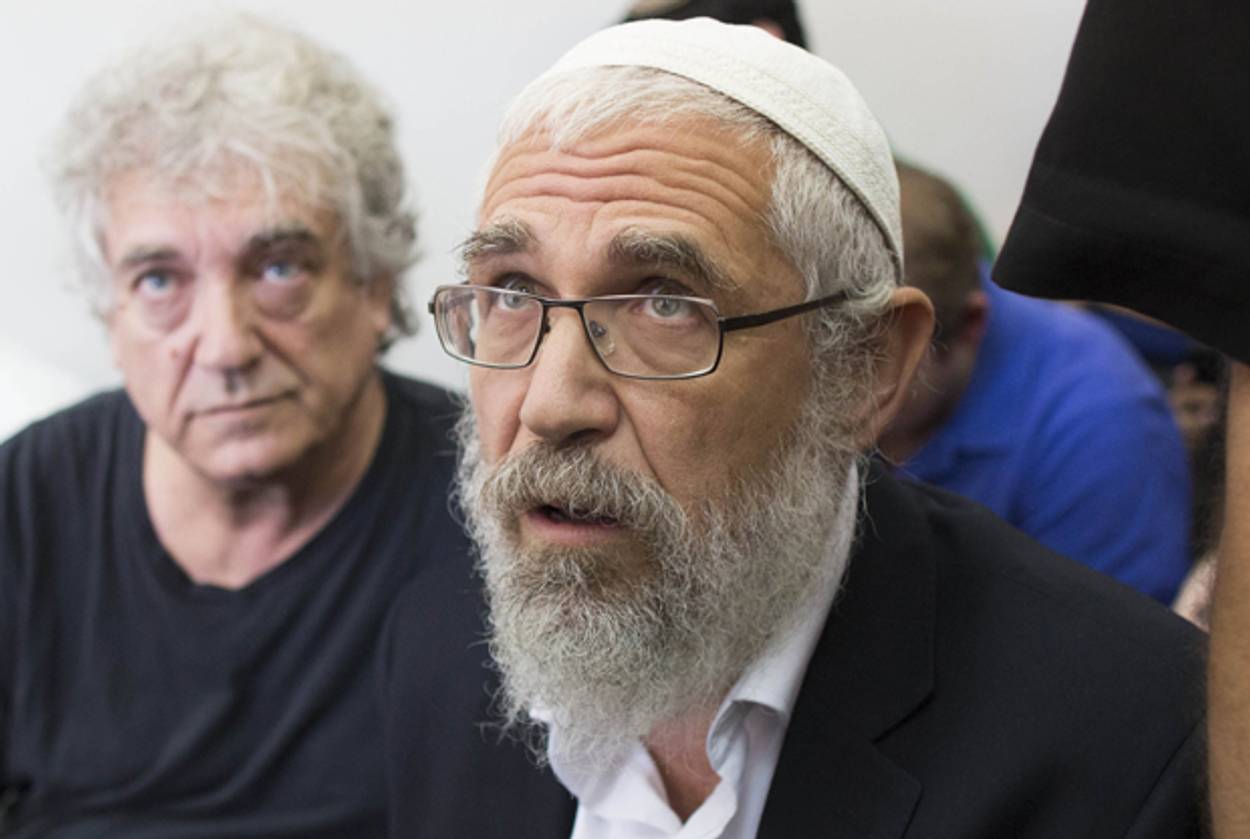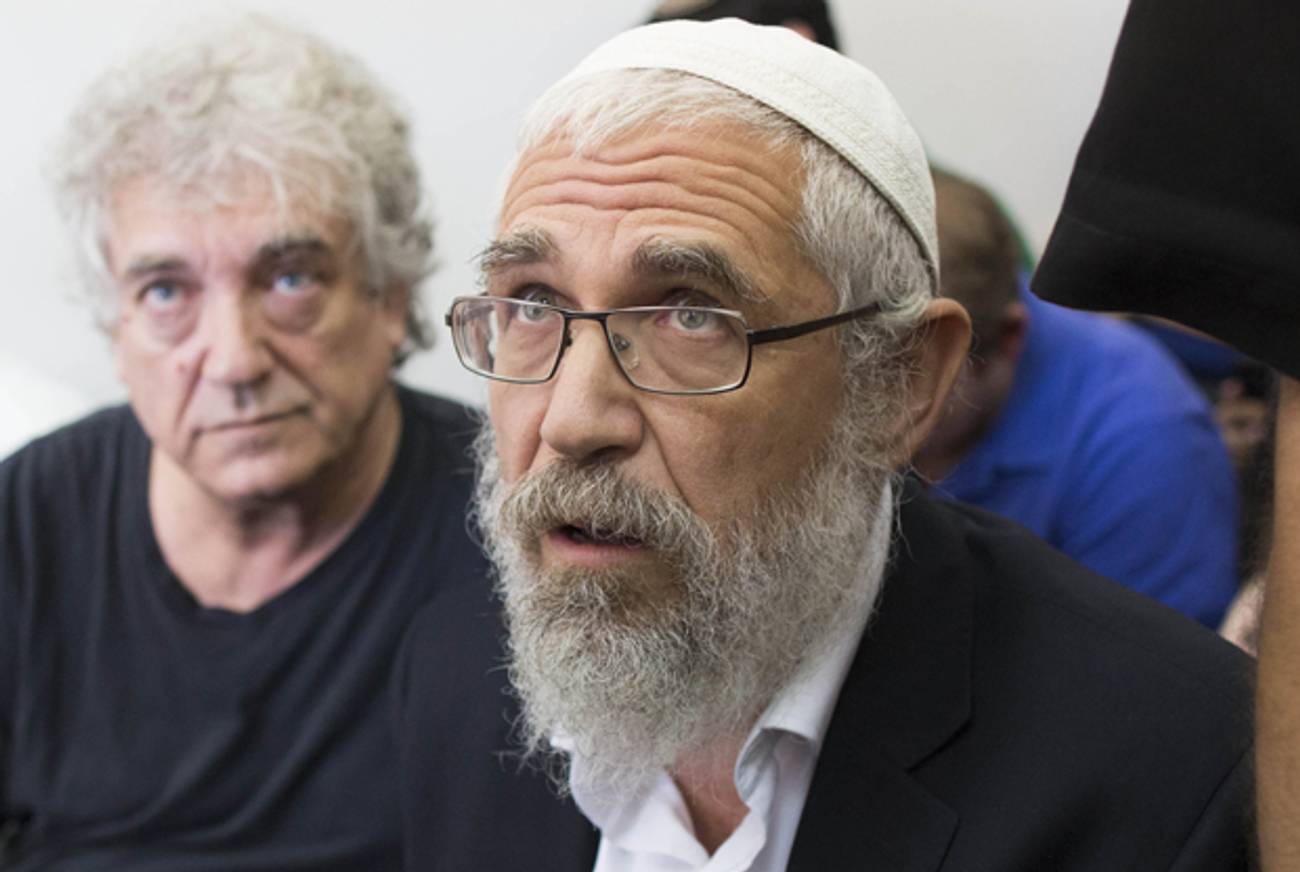How the Demons of Rabbi Mordechai Elon Continue To Haunt His Community
The charismatic leader refuses to take responsibility for his crimes




It was a decade ago when Rabbi Mordechai “Motti” Elon spoke in my Queens synagogue. He was riding a crest of popularity in the religious Zionist world, having gone from being principal of Chorev High School to rosh yeshiva of Yeshivat Hakotel to founding an international educational movement called MiBereishit, which produced materials and sponsored events for children in countries around the world. And he was every bit as charismatic as his reputation.
How ironic it is to me now, in hindsight, that I chose to have him speak not to the adults of my congregation, but to the children.
He breezed in, with a small entourage, and took charge. I don’t remember the contents of his talk, but I remember that he had the audience rapt. He would ask a child for her name and then manage later to use that name and address the child directly. Each audience member felt as if he were speaking to him or her directly.
Three years later, in 2006, Rabbi Elon abruptly retired from public view, citing health reasons.
As we know now, the real story was quite different. Accusations of improper behavior towards students who had come to him for counsel had led to the intervention of the Takana Forum, a group of more than 30 of Israel’s religious Zionist leaders, men and women—among them Rabbi Aharon Lichtenstein, head of Yeshivat Har Etzion, Rabbi Yaakov Ariel, Chief Rabbi of Ramat Gan, and Rabbi Shlomo Riskin, Chief Rabbi of Efrat—who investigate claims of abuse leveled against figures in their camp. According to the Jerusalem Post, Elon was found to have been engaging in acts “of a deliberate sexual nature carried out over an extended period of time,” even while professing to the forum that his problems had been resolved.
He was “asked to leave his post as head of the Kotel Yeshiva and cancel a number of public appearances and community roles.” In exchange, the forum did not make their findings public.
None of this, though, was revealed until February 2010, when the forum went public with the case against Elon, explaining that he had violated the terms of their private agreement, “in particular the requirement that he stay away from intimate, personal and private meetings with people seeking his advice or religious counsel.” Two accusers initially agreed to testify that he abused them, but one withdrew before the trial. Last August, Elon was convicted on two counts of indecent assault by force against a minor, and on December 18, 2013, he was sentenced to a six-month suspended sentence to be served through community service, three years of probation, and a fine of 10,000 NIS.
What has made every step of this process so wrenching is that it seems we are dealing with what the Kabbalists termed “light and darkness functioning simultaneously.” Just as the agony of Elon’s victim cries out for justice, so do the lives he transformed for the good demand recognition. For every blog post proclaiming justice has finally been served, there are commenters who even now insist on the innocence of their teacher, who can’t be guilty without turning their lives from tranquility to turmoil.
Exacerbating the whole affair is the decision of the dean of religious Zionist Rabbis, Rabbi Chaim Druckman, to allow Elon, even after his conviction, to teach students in his Hesder Yeshiva Or Etzion. Reluctance to kick Elon while he is down, coupled with respect for the venerable Druckman, have left much of the religious Zionist Rabbinic world paralyzed. It can safely be assumed that the Rabbis involved in the Takana Forum stand by their decision to take the matter to the authorities. In fact, a recording from 2012 has surfaced in which Forum member Rabbi Yaakov Ariel declares: “He admitted the facts.” Ariel condemned the release of the recording but did not dispute its veracity. But other religious Zionist leaders have not stepped forward to address the latest developments and Elon’s defenders.
That logjam may have finally broken when Rabbi Binyamin “Benny” Lau, director of Beit Morasha of Jerusalem’s Center for Judaism and Society ended his silence with an online statement. In it, he countered the views of those who continue to maintain Elon’s innocence and who reject the ruling against him as flawed. “The court has pronounced its verdict on Rav Elon,” he wrote. Alluding to attempts to discredit the rabbis on the Takana Forum, he added, “This is not a struggle between the rabbis of the Takana Forum and other rabbis, but a struggle against the very authority of the State to judge its criminals.” As to Rabbi Druckman intervening on Elon’s behalf, Lau wrote that the same man “who educated us in the principles of loyalty to the State…is leading us to a state of anarchy, the ultimate results of which cannot be predicted.”
On the American scene, as well, the pain is strong, but so is the feeling that leaders must speak out, particularly at the Rabbinical Council of America—the largest Modern Orthodox rabbinic organization in the world, and the one most connected to Elon. Rabbi Leonard Matanky, recently elected president of the RCA, reflected on the difficult questions that the fall of a great leader raises. “It is for this reason that I admire all the more the courage of the rabbis of Takana, and struggle to understand those who continue to defend Rabbi Elon,” Matanky wrote in an email, “I believe the former are heroes of Torah values; the latter, great people—who tragically fail to understand the severity of Rabbi Elon’s actions.”
Rabbi Shmuel Goldin, immediate past president of the RCA, had a stern message for Elon, and those who continue to defend him. “At a time when the credibility of religious leadership throughout the world is rightfully under scrutiny in the area of child abuse, responsible action on the part of the rabbinate of every community becomes even more important,” he wrote in an email. “The plight of abuse victims and their families is perpetuated and deepened when otherwise respected community leaders turn a blind eye to their pain by publicly siding with the perpetrators. Rav Elon has been found guilty in an Israeli court of law. That verdict should be accepted and respected by all.”
To my mind, though, it is Rabbi Elon’s refusal to take responsibility that is the gravest crime being committed now. He is quoted in Haaretz downplaying not only the court proceedings, but also the punishment, quipping, “I’ve been involved in community service for 40 years and I’m happy to continue such service until the age of 120.” When an abuser—of one victim or many—refuses to acknowledge the penalty, he adds to the pain of his victim, making him feel that, after a complex and excruciating process, his abuser is still getting off scot-free. Surely the rabbi who knew how to make every child in Queens feel special must know that his words victimize all over again.
While the well-being of the victims must be our paramount concern, I cannot help but feel that to some degree all of the Jewish people have lost something to the demons of Rabbi Mordechai Elon, once a leading candidate for the post of Ashkenazic Chief Rabbi of Israel. Very few people have the head, the heart, and the charisma to single-handedly change the path of a nation. It is hard to overstate the positive change that could have been brought about by an unsullied version of Rabbi Elon ascending to an office that has been mired in corruption and backroom deal-making. Instead, the view that meets our eyes is strewn with wreckage: the wrecked life and ongoing ordeal of Elon’s victims, the children around the world who will never know him as a positive model, and the Chief Rabbinate that might have been.
Moshe Rosenberg serves as Rav of Congregation Etz Chaim of Kew Gardens Hills and teaches Judaic Studies at the SAR Academy. His recent book is Morality for Muggles: Ethics in the Bible and the World of Harry Potter.
Moshe Rosenberg serves as Rav of Congregation Etz Chaim of Kew Gardens Hills and teaches Judaic Studies at the SAR Academy in New York. He is the author of Morality for Muggles: Ethics in the Bible and the World of Harry Potter and The Unofficial Hogwarts Haggadah.